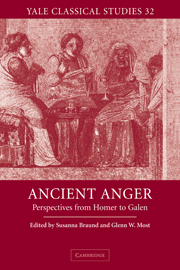Book contents
- Frontmatter
- Contents
- Notes on contributors
- Acknowledgments
- List of abbreviations
- Introduction
- Chapter 1 Ethics, ethology, terminology: Iliadic anger and the cross-cultural study of emotion
- Chapter 2 Anger and pity in Homer's Iliad
- Chapter 3 Angry bees, wasps, and jurors: the symbolic politics of ὀργή in Athens
- Chapter 4 Aristotle on anger and the emotions: the strategies of status
- Chapter 5 The rage of women
- Chapter 6 Thumos as masculine ideal and social pathology in ancient Greek magical spells
- Chapter 7 Anger and gender in Chariton's Chaereas and Callirhoe
- Chapter 8 “Your mother nursed you with bile”: anger in babies and small children
- Chapter 9 Reactive and objective attitudes: anger in Virgil's Aeneid and Hellenistic philosophy
- Chapter 10 The angry poet and the angry gods: problems of theodicy in Lucan's epic of defeat
- Chapter 11 An ABC of epic ira: anger, beasts, and cannibalism
- References
- Index of passages cited
- Index of proper names
- Index of topics
Chapter 2 - Anger and pity in Homer's Iliad
Published online by Cambridge University Press: 22 September 2009
- Frontmatter
- Contents
- Notes on contributors
- Acknowledgments
- List of abbreviations
- Introduction
- Chapter 1 Ethics, ethology, terminology: Iliadic anger and the cross-cultural study of emotion
- Chapter 2 Anger and pity in Homer's Iliad
- Chapter 3 Angry bees, wasps, and jurors: the symbolic politics of ὀργή in Athens
- Chapter 4 Aristotle on anger and the emotions: the strategies of status
- Chapter 5 The rage of women
- Chapter 6 Thumos as masculine ideal and social pathology in ancient Greek magical spells
- Chapter 7 Anger and gender in Chariton's Chaereas and Callirhoe
- Chapter 8 “Your mother nursed you with bile”: anger in babies and small children
- Chapter 9 Reactive and objective attitudes: anger in Virgil's Aeneid and Hellenistic philosophy
- Chapter 10 The angry poet and the angry gods: problems of theodicy in Lucan's epic of defeat
- Chapter 11 An ABC of epic ira: anger, beasts, and cannibalism
- References
- Index of passages cited
- Index of proper names
- Index of topics
Summary
“The rage (Μñνιν) – sing it, goddess, that of Peleus' son Achilles: accursed (οὐλομένην) rage, which laid countless woes upon the Achaeans” (1.1–2): this is how the poet addresses his Muse at the opening of his Iliad. What precisely does he have in mind? On its own, the opening line could be taken simply to be asking in general for some poem about an anger – any anger – of Achilles. But the highly pejorative epithet οὐλομένην (“accursed”), which begins the second line with a conspicuous and therefore presumably significant enjambment, and above all the relative clause that goes on to fill out that line and specifies just which anger the poet means make every appearance of promising his listeners a poem not just in general about some anger of Achilles, but specifically about that celebrated anger of his, which was directed against Agamemnon and which cost so many Greek warriors their lives.
But it is well known that, if we measure the Iliad as we have it against this opening announcement of its theme, the Muse seems to have given her poet rather more than he asked for, and this in two regards.
- Type
- Chapter
- Information
- Ancient AngerPerspectives from Homer to Galen, pp. 50 - 75Publisher: Cambridge University PressPrint publication year: 2004
- 6
- Cited by



